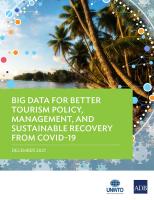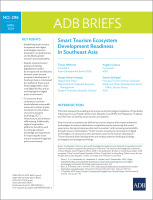Light and sound show at Gardens by the Bay. Singapore serves as the benchmark for smart destinations in the region because of its high level of digitalization. Photo credit: iStock/kitzcorner.
Digitalization can transform the whole tourism value chain and enhance tourism’s contribution to the Sustainable Development Goals.
Southeast Asia is looking to digitalization and innovation to make tourism growth more sustainable and inclusive. Research shows deploying smart solutions for tourist destinations can enhance visitor experience, curb overtourism, preserve the environment, and improve the quality of life of surrounding communities.
Studies conducted by ADB looked into how digitalization can transform the whole tourism value chain—from travel facilitation to tourism asset management—and enhance tourism’s contribution to the Sustainable Development Goals (SDGs). They also examined the role of digitalization in providing adequate and timely data to support long-term planning, policy design, governance, implementation, and monitoring.
“Not only can smart tools enhance the travel experience, but they can also boost traveler numbers and encourage more responsible and sustainable practices among tourists and the tourism industry through green destinations, energy-efficient transport, sustainable certification and badges, and carbon footprint calculators for tourists,” says an ADB report. It notes that big data has become a valuable tool in supporting sustainable tourism practices, such as measuring carrying capacity and monitoring tourism flows.
Tourism’s digital transformation
As an early adopter of digital technology, tourism spurred disruptive innovations that made travel more accessible, affordable, and safe. Online platforms democratized travel, offering people a wide menu of options in terms of destinations, transportation, accommodations, and related services. Technology-driven business models, such as peer-to-peer online marketplaces (e.g., Airbnb), also opened opportunities for people looking for new or additional streams of income. During the COVID-19 pandemic, digitalization provided the travel and tourism industry a way to survive through cashless and contactless transactions, automated check-in and check-out, crowd management, and digital travel certificates, to name a few.
Hard lessons from the pandemic underscore the importance of addressing vulnerabilities and strengthening the industry’s resilience.
The Association of Southeast Asian Nations (ASEAN) has come up with a holistic and long-term strategic plan to guide the sustainable development of the tourism industry, which is a major contributor to economies in the region. The ASEAN Framework for Sustainable Tourism Development, which was adopted in 2022, considers smart destinations as “a boon to sustainable development,” with technology-driven solutions facilitating “evidence-based decision-making and the responsible management of tourism and its impacts.”
Developing smart destinations, however, requires significant resources in closing gaps in digital infrastructure and digital skills. The ADB report says countries in the region face three major challenges: lack of financial and human resources, digital divide between countries and between urban and rural areas, and regulatory challenges (i.e., data privacy and security).
Singapore serves as the benchmark for smart destinations in the region because of its high level of digitalization. It scores high in terms of smart governance, accessibility, smart mobility, sustainability, and inclusivity.
Since 2018, the Singapore Tourism Board has been using big data to analyze tourism markets and trends and to help tourism enterprises customize and enhance their products and services to get more business. Popular destinations across the region have also started to use big data. Phuket in Thailand has installed smart sensors and uses smart tools to manage the volume of tourists and monitor the ocean and weather conditions.
The role of regional cooperation
The digital transformation of tourism opens opportunities for bilateral and regional cooperation with tourism value chains crossing international borders. Areas for cooperation include policy coordination, pooling of resources, joint marketing, infrastructure and skills development, sharing of knowledge and best practices, and developing regional platforms.
“There are clear economies of scale when developing institutional setups, digital applications, and skills for big data,” says the ADB report. “This makes development of regional platforms a more feasible option, instead of each country in a region developing its own, which is likely prohibitive for most developing economies.”
Regional cooperation can support national agendas and “promote standardization and harmonization to facilitate travel across countries.”


